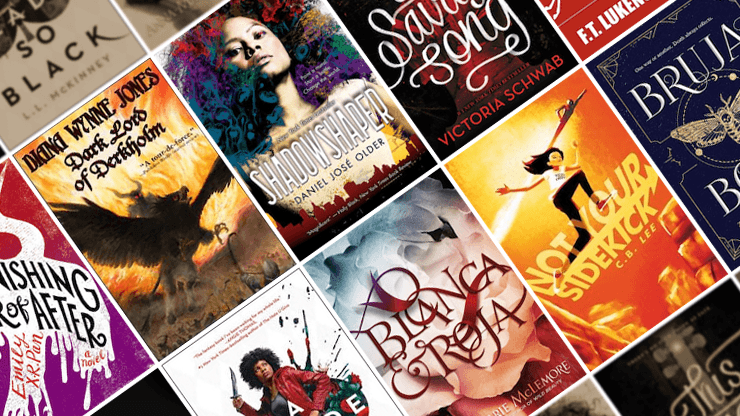Every so often someone laments the lack of good parents in young adult fantasy and science fiction. This is usually followed up with the claim that good parents make for poor YA fiction because good parents don’t let their kids go off on dangerous adventures to save the world. To which I usually reply that they clearly don’t read enough YA SFF. Parents—yes, even the good ones—have a long history of involvement in young adult science fiction and fantasy, a trend that has actually been increasing in recent years.
In that vein, here are ten YA SFF novels where the parents are very much alive, are good people, and in some cases who even join the teen protagonist on their quest. There are, of course, a zillion more, so please add your recs in the comments!
The Girl From Everywhere by Heidi Heilig
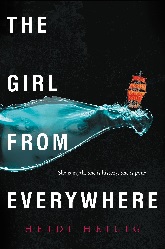 In all of Heidi Heilig’s books, parents join their main protagonist child on their journey. With The Girl From Everywhere and the conclusion to the duology, The Ship Beyond Time, Slate and his daughter Nix travel through time and space together as captain and first mate. From her father Nix is learning how to become a Navigator and one day hopes to captain her own ship. But first she has to keep him from potentially erasing her from existence by changing the past to save his dead wife. Slate isn’t a bad guy by any means; he’s just hurt and lonely and desperate. The love he has for his family sometimes gets muddled with his obsessive tendencies and grief. Plus, it’s important to recognize that people with a mental illness (Slate is bipolar) can still be good parents. Sounds obvious, I know, but the pernicious trope of the “crazy parent” is unfortunately pervasive.
In all of Heidi Heilig’s books, parents join their main protagonist child on their journey. With The Girl From Everywhere and the conclusion to the duology, The Ship Beyond Time, Slate and his daughter Nix travel through time and space together as captain and first mate. From her father Nix is learning how to become a Navigator and one day hopes to captain her own ship. But first she has to keep him from potentially erasing her from existence by changing the past to save his dead wife. Slate isn’t a bad guy by any means; he’s just hurt and lonely and desperate. The love he has for his family sometimes gets muddled with his obsessive tendencies and grief. Plus, it’s important to recognize that people with a mental illness (Slate is bipolar) can still be good parents. Sounds obvious, I know, but the pernicious trope of the “crazy parent” is unfortunately pervasive.
Not Your Sidekick by C.B. Lee
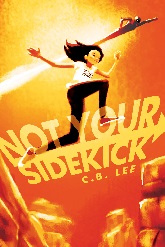 Jessica Tran lives in the 22nd century city of Andover, a thriving metropolis that just so happens to be the headquarters of the Heroes’ League of Heroes, a group of superpowered people. Including Jess’ whole family. Everyone but her, that is. As a non-superpowered human, a bisexual girl, and the American daughter of two Asian immigrant parents (refugees from China and Vietnam), Jess deals a lot with what it’s like to be in between two “sides.” She feels stuck on the outside looking in on worlds she’ll never be able to fully access. Her parents are supportive, but Jess wants to forge her own path … it just so happens that path leads straight to an internship with a supervillain. Now she’s working for the very person the good guys are trying to defeat. What would her parents say if they ever found out?
Jessica Tran lives in the 22nd century city of Andover, a thriving metropolis that just so happens to be the headquarters of the Heroes’ League of Heroes, a group of superpowered people. Including Jess’ whole family. Everyone but her, that is. As a non-superpowered human, a bisexual girl, and the American daughter of two Asian immigrant parents (refugees from China and Vietnam), Jess deals a lot with what it’s like to be in between two “sides.” She feels stuck on the outside looking in on worlds she’ll never be able to fully access. Her parents are supportive, but Jess wants to forge her own path … it just so happens that path leads straight to an internship with a supervillain. Now she’s working for the very person the good guys are trying to defeat. What would her parents say if they ever found out?
Bruja Born by Zoraida Córdova
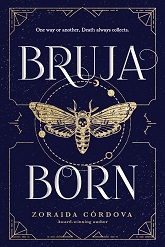 Both books in Zoraida Córdova’s Brooklyn Brujas series—Labyrinth Lost and Bruja Born—feature not just the Mortiz sisters but their parents, extended family, and close family friends. In the first, Alex’s refusal to accept her fate as the most powerful Encantrix in her generation drives her to casts a spell that accidentally traps her entire family in the Underworld. The Mortiz family is much more involved in the second book, Bruja Born, where Lula raises her boyfriend from the dead and sets off a zombie apocalypse. Without the direct help from her family and friends, Lula would fail before she even began. Her parents in particular are intimately involved in the proceedings, everything from helping to heal the injured to strategizing and planning. Things go wrong or get worse whenever Lula chooses not to involve her parents—that’s how important they are to the story.
Both books in Zoraida Córdova’s Brooklyn Brujas series—Labyrinth Lost and Bruja Born—feature not just the Mortiz sisters but their parents, extended family, and close family friends. In the first, Alex’s refusal to accept her fate as the most powerful Encantrix in her generation drives her to casts a spell that accidentally traps her entire family in the Underworld. The Mortiz family is much more involved in the second book, Bruja Born, where Lula raises her boyfriend from the dead and sets off a zombie apocalypse. Without the direct help from her family and friends, Lula would fail before she even began. Her parents in particular are intimately involved in the proceedings, everything from helping to heal the injured to strategizing and planning. Things go wrong or get worse whenever Lula chooses not to involve her parents—that’s how important they are to the story.
Shadowshaper by Daniel José Older
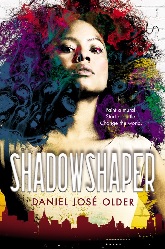 Much like Brooklyn Brujas, family is all in Daniel José Older’s Shadowshaper series. Sierra and her parents take care of abuelo Lázaro, who moved in with them after a severe stroke left him mostly unable to speak or move. He introduces her to the world of shadowshapers, and Sierra learns about the magical powers of her ancestors. Although her parents try to keep Sierra away from magic, they do it because they love her and want to keep her safe. As we learn in the second novel, Shadowhouse Fall, there are grave consequences for Sierra if she follows in her abuela’s footsteps and assumes the mantle of Lucera (basically the head witch in charge), so there’s plenty of reason for her parents to be concerned.
Much like Brooklyn Brujas, family is all in Daniel José Older’s Shadowshaper series. Sierra and her parents take care of abuelo Lázaro, who moved in with them after a severe stroke left him mostly unable to speak or move. He introduces her to the world of shadowshapers, and Sierra learns about the magical powers of her ancestors. Although her parents try to keep Sierra away from magic, they do it because they love her and want to keep her safe. As we learn in the second novel, Shadowhouse Fall, there are grave consequences for Sierra if she follows in her abuela’s footsteps and assumes the mantle of Lucera (basically the head witch in charge), so there’s plenty of reason for her parents to be concerned.
Blanca & Roja by Anna-Marie McLemore
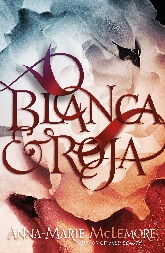 Once again, family is all. The del Cisne sisters are cursed. In every generation, one sister will live a normal life while the other will be taken by swans and transformed into one, her human life forgotten forever. As Blanca and Roja try to game the system by making themselves more alike to make it impossible for the swans to choose, their parents try to make them more different. Blanca’s mother wants her to be graceful and beautiful so the swans will spare her, and Roja’s father wants her to be brave and bold to prove to the swans she’s worthy of her humanity. When the swans finally come, their parents leave with the rest of their extended family so as not to interfere, but their influence runs deep and wide. Page and Yearling, the sisters’ love interests, also have parental involvement. For Page, it’s a matter of coming to terms with parents who love but don’t understand her, and Yearling is in hiding from his dysfunctional and abusive relations. Family, the way it loves and pressures and hurts and heals, cuts through every character.
Once again, family is all. The del Cisne sisters are cursed. In every generation, one sister will live a normal life while the other will be taken by swans and transformed into one, her human life forgotten forever. As Blanca and Roja try to game the system by making themselves more alike to make it impossible for the swans to choose, their parents try to make them more different. Blanca’s mother wants her to be graceful and beautiful so the swans will spare her, and Roja’s father wants her to be brave and bold to prove to the swans she’s worthy of her humanity. When the swans finally come, their parents leave with the rest of their extended family so as not to interfere, but their influence runs deep and wide. Page and Yearling, the sisters’ love interests, also have parental involvement. For Page, it’s a matter of coming to terms with parents who love but don’t understand her, and Yearling is in hiding from his dysfunctional and abusive relations. Family, the way it loves and pressures and hurts and heals, cuts through every character.
The Rules and Regulations for Mediating Myths and Magic by F. T. Lukens
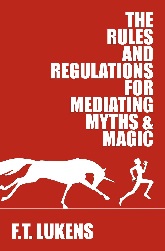 All high school senior Bridger Whitt wants is to get the hell out of Midden, Michigan. To finance an out of state college, he takes a job as an assistant to the eccentric Pavel Chudinov. In Pavel’s weird old house he discovers a world of magic lurking in the shadows. His mom doesn’t participate in the main plot, but she still has pull over Bridger’s life. As a single mother (we never learn what happened to his dad), she works a lot, often double shifts. Sometimes that means they barely see each other, but that doesn’t mean she doesn’t care about his welfare. She works as much as she does because she cares so much about him. Her lack of intervention has more to do with her respecting his personal privacy than disinterest in his life. She doesn’t pry but waits for him to be ready to talk.
All high school senior Bridger Whitt wants is to get the hell out of Midden, Michigan. To finance an out of state college, he takes a job as an assistant to the eccentric Pavel Chudinov. In Pavel’s weird old house he discovers a world of magic lurking in the shadows. His mom doesn’t participate in the main plot, but she still has pull over Bridger’s life. As a single mother (we never learn what happened to his dad), she works a lot, often double shifts. Sometimes that means they barely see each other, but that doesn’t mean she doesn’t care about his welfare. She works as much as she does because she cares so much about him. Her lack of intervention has more to do with her respecting his personal privacy than disinterest in his life. She doesn’t pry but waits for him to be ready to talk.
Dark Lord of Derkholm by Diana Wynne Jones
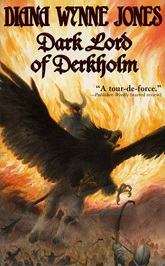 Good parents pop up frequently in Diana Wynne Jones’ novels, but one of my favorite examples is the Derkholm series. Every year Mr. Chesney’s Pilgrim Parties show up in Blade’s fantasy world, a vacation package filled with tourists from our world. During the tour, the entire town is turned into a fantasyland theme park. When Blade’s chill inventor father Derk is picked to play the Dark Lord, he and his wife Enchantress Mara are forced to turn their loving home into an evil lair. Blade and his siblings (five of which are part griffin) band together to help their parents out and shake off Chesney’s shackles. Derk and Mara are charming and pleasant parents who raised honest, justice-minded children. The plot conflict comes not from child-parent relations but Chesney being an exploitative jerk. And yeah, technically this series is middle grade, but it’s by the great, wonderful, incredible Diana Wynne Jones so whatevs.
Good parents pop up frequently in Diana Wynne Jones’ novels, but one of my favorite examples is the Derkholm series. Every year Mr. Chesney’s Pilgrim Parties show up in Blade’s fantasy world, a vacation package filled with tourists from our world. During the tour, the entire town is turned into a fantasyland theme park. When Blade’s chill inventor father Derk is picked to play the Dark Lord, he and his wife Enchantress Mara are forced to turn their loving home into an evil lair. Blade and his siblings (five of which are part griffin) band together to help their parents out and shake off Chesney’s shackles. Derk and Mara are charming and pleasant parents who raised honest, justice-minded children. The plot conflict comes not from child-parent relations but Chesney being an exploitative jerk. And yeah, technically this series is middle grade, but it’s by the great, wonderful, incredible Diana Wynne Jones so whatevs.
This Savage Song by Victoria Schwab
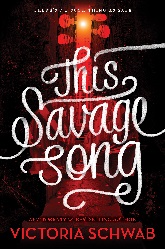 Kate Harker’s dad certainly doesn’t meet the terms of this list. He’s a terrible father and an even worse human. August Flynn’s adoptive father isn’t a saint, but he’s not awful either. The Flynn and Harker patriarchs lead opposing factions in the fractured city of Verity, Harker leading a brutal dictatorship and Flynn a struggling democracy. Where Harker uses monsters to inflict violence, Flynn and his wife treat them like family. August, Ilsa, and Leo rely on the Flynns for training, stability, and support. The Flynns believe in their monstrous adopted children, more than August, Leo, and Ilsa believe in themselves. They help them learn to reign in their vicious powers and use them for good.
Kate Harker’s dad certainly doesn’t meet the terms of this list. He’s a terrible father and an even worse human. August Flynn’s adoptive father isn’t a saint, but he’s not awful either. The Flynn and Harker patriarchs lead opposing factions in the fractured city of Verity, Harker leading a brutal dictatorship and Flynn a struggling democracy. Where Harker uses monsters to inflict violence, Flynn and his wife treat them like family. August, Ilsa, and Leo rely on the Flynns for training, stability, and support. The Flynns believe in their monstrous adopted children, more than August, Leo, and Ilsa believe in themselves. They help them learn to reign in their vicious powers and use them for good.
A Blade So Black by L.L. McKinney
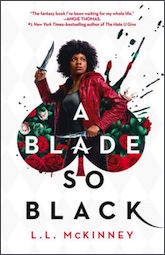 Alice’s mom is more of a plot point that a fully fleshed out character—she doesn’t even get a name—but the underlying context is what makes her worthy of inclusion on this list. Alice spends her time playing Buffy the Nightmare Slayer in real world Atlanta and portal world Wonderland while her mother frets over her child’s safety. She doesn’t want Alice taking risks, but there’s a deeper socio-historical reason for it. As I wrote in my review, “Everyone knows the death of a child is a tragedy, but [Black women] know. Surviving the loss of our children, our men, and our families is built into the framework of our resistance. Black women keep our communities and families together in the face of ever-present tragedy. Alice’s mother’s fears are part of a long tradition. We had those same fears during slavery, Jim Crow, and the Civil Rights Movement, and we will have them for the foreseeable future.” She can’t stop Alice from living in a dangerous world, but she can teach her caution, preparation, and protection.
Alice’s mom is more of a plot point that a fully fleshed out character—she doesn’t even get a name—but the underlying context is what makes her worthy of inclusion on this list. Alice spends her time playing Buffy the Nightmare Slayer in real world Atlanta and portal world Wonderland while her mother frets over her child’s safety. She doesn’t want Alice taking risks, but there’s a deeper socio-historical reason for it. As I wrote in my review, “Everyone knows the death of a child is a tragedy, but [Black women] know. Surviving the loss of our children, our men, and our families is built into the framework of our resistance. Black women keep our communities and families together in the face of ever-present tragedy. Alice’s mother’s fears are part of a long tradition. We had those same fears during slavery, Jim Crow, and the Civil Rights Movement, and we will have them for the foreseeable future.” She can’t stop Alice from living in a dangerous world, but she can teach her caution, preparation, and protection.
The Astonishing Color of After by Emily X.R. Pan
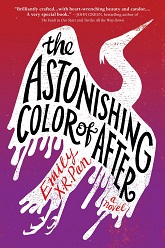 This entry is stretching the premise a bit, but there was no way I could not include it. Leigh Chen Sanders travels to Taiwan after her mother’s unexpected death. There she lives with her grandparents and uncovers the secrets her mother left behind. Leigh’s white father loves her but struggles to connect with her once it’s just the two of them. He’s a constant presence in the novel, albeit mostly in Leigh’s thoughts and memories. Leigh also believes her mother’s spirit has taken the form of a large red bird that appears every time she reaches her breaking point. The mother-bird guides her indirectly, and reveals things her grandparents had tried to bury. Her grandparents are as integral to the plot as Leigh is. As she tries to bond with them without speaking their language, she comes to understand herself, her parents, her grandparents, and the difficult choices each has made.
This entry is stretching the premise a bit, but there was no way I could not include it. Leigh Chen Sanders travels to Taiwan after her mother’s unexpected death. There she lives with her grandparents and uncovers the secrets her mother left behind. Leigh’s white father loves her but struggles to connect with her once it’s just the two of them. He’s a constant presence in the novel, albeit mostly in Leigh’s thoughts and memories. Leigh also believes her mother’s spirit has taken the form of a large red bird that appears every time she reaches her breaking point. The mother-bird guides her indirectly, and reveals things her grandparents had tried to bury. Her grandparents are as integral to the plot as Leigh is. As she tries to bond with them without speaking their language, she comes to understand herself, her parents, her grandparents, and the difficult choices each has made.
Alex Brown is a YA librarian by day, local historian by night, pop culture critic/reviewer by passion, and an ace/aro Black woman all the time. Keep up with her every move on Twitter, check out her endless barrage of cute rat pics on Instagram, or follow along with her reading adventures on her blog.










